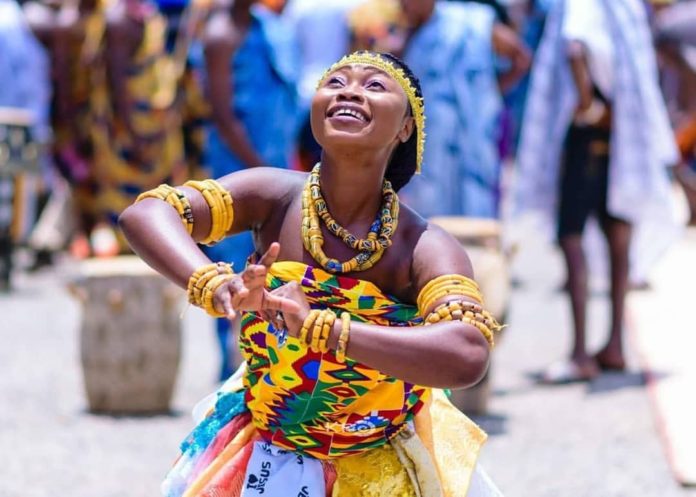Adowa Dance is one of the most popular dances practiced in Ghana. It has subtly become the official traditional dance to welcome dignitaries and popular personalities to Ghana.
It is mainly performed at cultural events such as festivals, funerals, marriage ceremonies, etc. More to it, the Adowa dance is a sign of expression, that allows performers to communicate their emotions and feelings through their hands and feet.
Adowa is originally an African dance by the people of the Akan tribe in Ghana. Historians believe the dance originated from the movement of an antelope which is called “Adowa” in the Akan language.
According to oral history, the dance originated in the early days of warfare after the Great Asante Queen, Abrewa Tutuwaa, fell sick, and a powerful chief priest revealed that the only way to get her healed was by getting a live antelope from the wild to pacify the gods.
Some warlords were sent to the forest where they witnessed the live antelope’s outstanding and captivating movements. When they returned home, they imitated the skillful moves of the antelope and danced it to all the household.
According to this account, the Asafo warriors’ group was the first to have started the Adowa dance. Then old women also imitated and improvised the moves of the dance until it became an adored dance amongst the Asante ethnic group. A dance that was initially dominated by women now has no boundaries of gender.
Adowa is danced for the installation of a ruler. After a ruler has sworn the oath, he will be carried and after then he will be engaging in the Adowa dance before being placed on the stool. When he is seated, they will continue dancing for him.
This particular dance has a special attachment to royalty since every move, stance or gesture is a message with meaning, hence, trained people usually do this dance in gatherings where Royals are present.
It is more satisfying to note that despite the increase in modern instruments, Adowa requires traditionally made sets of instruments for the whole setup together with a dancer adorned in KENTE (traditional attire for the Asantes).


